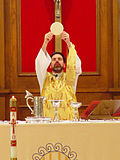- Oremus
-
For other uses, see Oremus (disambiguation).
Oremus (Latin for let us pray) is the invitation to pray, said before short prayers in the Roman Catholic Mass and the Lutheran Divine Service, as well as other Western liturgies.
It is used as a single exclamation[clarification needed] in the East (in the rites of the Assyrian and Jacobite Orthodox Churches), or the imperative: "Pray" or "Stand for prayer" (in the Coptic Church); most commonly, however with a further determination, "Let us pray to the Lord" (τοῦ Κυρίου δεηθῶμεν, used throughout the Byzantine Rite, where the laity replies with "Kyrie Eleison" before the priest recites the prayer), and so on. Louis Duchesne thought that the Gallican Collects were also introduced by the word "Oremus" ("Origines du Culte", Paris, 1898, 103). That was not the case in the Mozarabic Rite, where the celebrant uses the word only twice, before the Agios and Pater noster.
"Oremus" is said (or sung) in the Roman Rite before all separate collects in the Mass, Office, or on other occasions (but several collects may be joined with one Oremus). It is also used before the Post-Communion, the offertory, and before the introduction to the Pater noster and other short prayers (e.g., "Aufer a nobis") in the form of collects.
It appears that the Oremus did not originally apply to the prayer that now follows it. It is thought that it was once an invitation to private prayer, very likely with further direction as to the object, as is now the case in the liturgy for Good Friday ("Oremus pro ecclesia sancta Dei"). The deacon then said: "Flectamus genua" ("let us kneel"), and all knelt in silent prayer. After a time the people were told to stand up ("Levate"), and finally the celebrant collected all the petitions in one short sentence said aloud (hence, the collect). Eventually this was simplified into the word alone preceding the prayer.
External links
- Home page of Church of England Oremus website
- Home page of Roman Catholic Oremus Music website
 "Oremus". Catholic Encyclopedia. New York: Robert Appleton Company. 1913.
"Oremus". Catholic Encyclopedia. New York: Robert Appleton Company. 1913.
Order of the Divine Service in Lutheranism Preparatory Service Entrance hymn and Trinitarian formula (known as the Invocation) · Penitential Rite including the Confiteor and Declaration of Grace (or Asperges on Easter)
The Service of the Word Introit · Gloria Patri · Kýrie · Gloria · Dominus Vobiscum · Oremus · Collect · Old Testament reading · gradual (or Responsorial Psalm) · Epistle · Alleluia (tract during Lent) · Gospel · Hymn of the day · Homily or Postil (Sermon) · Nicene Creed (Athanasian Creed on Trinity Sunday) · Offertory · Prayers of the FaithfulThe Service of the Eucharist Preface (Sursum corda / Sanctus / Hosanna) · Eucharistic Prayer (Epiclesis / Words of Institution / Memorial Acclamation) · Lord's Prayer · Sign of peace / pax (elevation) · Agnus Dei · Distribution · Nunc dimittis · Postcommunion · Benedicamus Domino · Benediction · Dismissal · Ite missa estParticipants Parts of the Sanctuary altar · altar bell · altar crucifix · altar rails · kneeler · piscina · processional cross · tabernacleCandles Liturgical vessels Liturgical objects collection basket · holy water · incense (use) · paten · sacramental bread (wafer) · sacramental wine · thuribleVestments Liturgical books and hymnals Agenda · Evangelical Lutheran Hymn-Book · Evangelical Lutheran Worship · Lutheran Book of Worship · Lutheran Hymnal · Lutheran Hymnal with Supplement · Lutheran Service Book · Lutheran Worship · Service Book and Hymnal Lutheranism Portal
Lutheranism Portal This article incorporates text from a publication now in the public domain: Herbermann, Charles, ed (1913). "Oremus". Catholic Encyclopedia. Robert Appleton Company.Categories:
This article incorporates text from a publication now in the public domain: Herbermann, Charles, ed (1913). "Oremus". Catholic Encyclopedia. Robert Appleton Company.Categories:- Latin words and phrases
- Structure of the Mass
Wikimedia Foundation. 2010.
